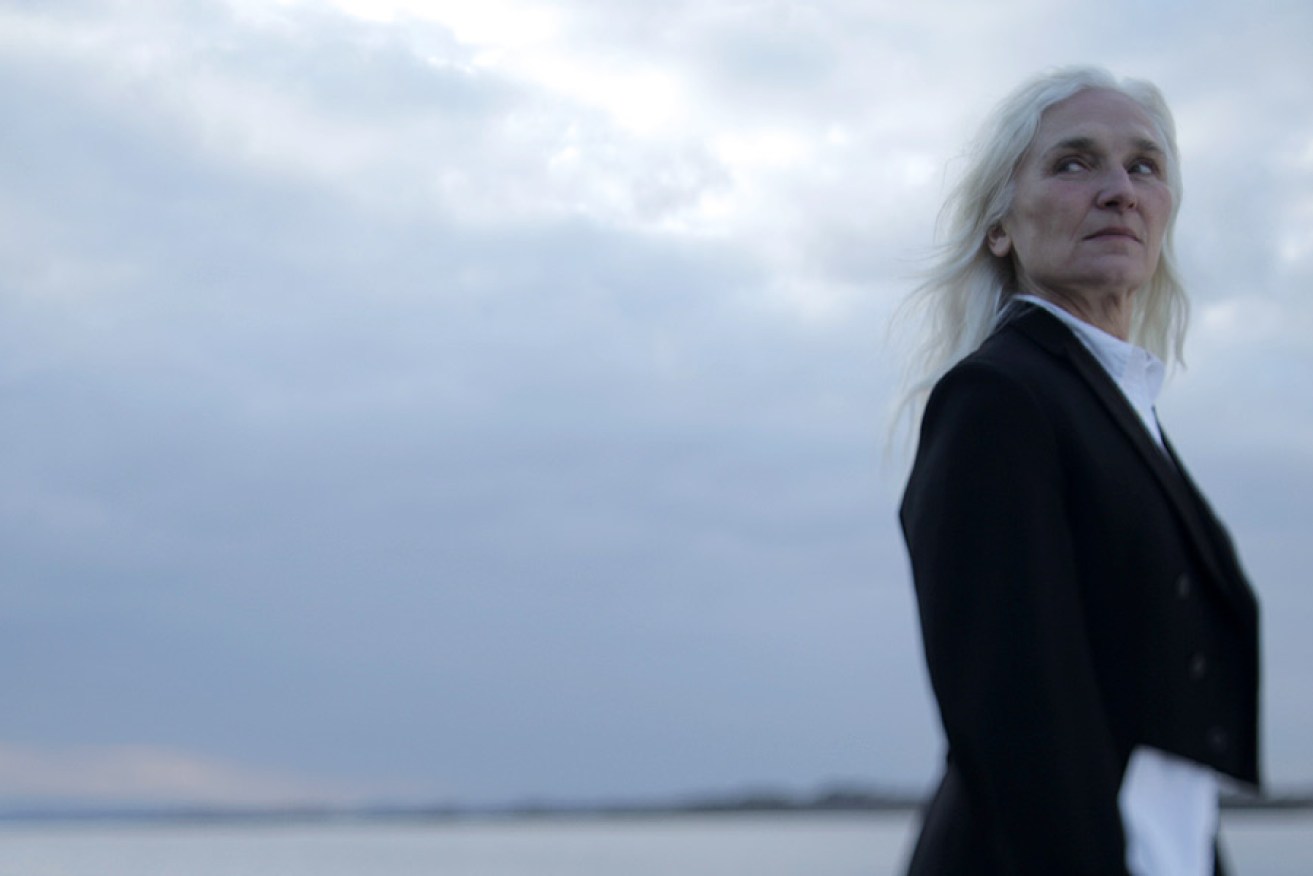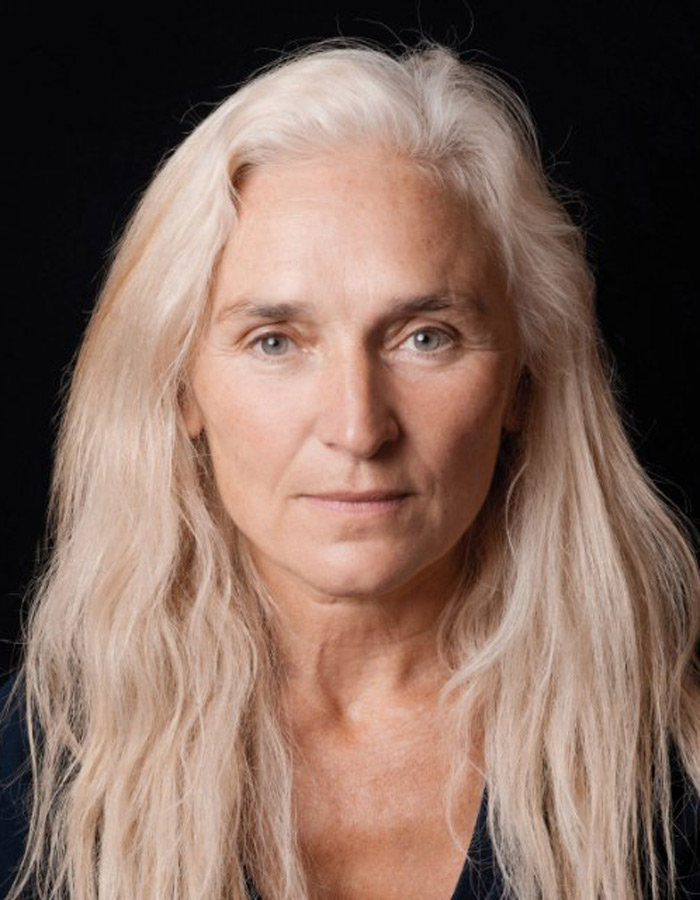A journey down river with Olwen Fouéré

Fouéré's striking physical presence helps captivate audiences. Photo: Colm Hogan
Irish actress Olwen Fouéré’s mesmerising and much-lauded one-woman show riverrun is adapted from Finnegans Wake – a book notoriously difficult to read.
But Fouéré says audience members don’t have to have studied James Joyce’s novel to appreciate the Adelaide Festival performance; in fact, she hasn’t read it from cover to cover herself.
“I think it’s probably no harm that they know it’s challenging material in an invented language, but in a way, if they don’t know it, it might be all the more fascinating,” she tells InDaily.
“Whether one knows the material or not, it still demands that we bypass the rational brain, so sometimes academics have a tougher time with it.”
 In riverrun, which was created by Fouéré and will have its Australian premiere at the Festival, she takes on the voice of Anna Livia Plurabelle – the personification of Dublin’s River Liffey in the final chapter of Finnegans Wake.
In riverrun, which was created by Fouéré and will have its Australian premiere at the Festival, she takes on the voice of Anna Livia Plurabelle – the personification of Dublin’s River Liffey in the final chapter of Finnegans Wake.
“I am now of the belief it was never meant to be read in a linear fashion,” she says of the book.
“If I start at the beginning I can read 10 pages and then I’ve had enough, but if I start at the back page and work backwards, it’s absolutely compelling.”
UK reviewers have been glowing in their praise of the actress’s performance in riverrun, variously describing it as a hypnotic interpretation, a tour de force, and possibly even life-changing. The production is said to submerge audiences in the river, with Fouéré’s powerful vocal and physical performance enhanced by clever lighting and an evocative soundtrack that ranges from a NASA space recording to “The Lonesome Road” (a song Joyce is said to have listened to).
Joyce took 17 years to write Finnegans Wake, with the book finally published in 1939. You’ll be hard-pressed to find a concise summary of the rambling narrative, though much has been written about the unconventional, stream-of-consciousness writing style and complex language, which includes both invented tongue-twister words and multilingual puns.
It is that language – described by Joyce as a sound dance – that most fascinates Fouéré, who believes it enables the communication of a shared “interior life” or experience much better than the formulaic language most people use every day.
“Ultimately it’s given voice to the dream language, the language of the unconscious that we carry around with us all the time … it somehow gives voice to silence.
“It speaks directly from the internal experience of something.
“I imagine I’m not a character; I’m like a cell in a cluster of cells and I’m communicating to my fellow cells.”
One of Fouéré’s favourite words in the book is gnomeosulphidosalamermauderman, which rolls off her Irish tongue with delightful silkiness. Essentially, she says, it is a mixture of different words that describe “the glorious combination of elements in a man” – though the meaning seems less important than the sound.
Fouéré says Joyce’s language operates on the same level as music and rhythm, with multiple meanings. And like music, riverrun needs to be absorbed by an audience, rather than thought about too deeply.
“It demands a certain amount of surrender for me to perform it and a certain amount of surrender for the audience to appreciate it.”
Fouéré has always been fascinated by Finnegans Wake, and it was her live public reading of the final page at a James Joyce event in Sydney that sparked the idea for riverrun. She sensed that the audience was moved by both the language and the fact that she was voicing an element (the river) rather than a character.
“We are still kind of attached to the idea of a human being or character speaking rather than an element of our being,” says the actress, who has built a reputation for avant-garde work.
“I never think in terms of a character; I think in terms of forces of energy flowing into each other.
“We spend our lives watching one another and people in the street, so I think theatre really doesn’t have to be a soap opera; it can be something else. I’m interested in that – what can happen in theatre that you don’t recognise, but in a way you kind of do.”
One of Fouéré’s reasons for selecting the final 10 pages is that the river is speaking. She says the final line – which ends mid-sentence and circles back to the opening line, which begins mid-sentence – is the best she has read in any book:
a way a lone a last a loved a long the
“I was very attracted to this idea of kind of ending on a suspension,” Fouéré says.
“There could be something else, either a birth or a death. I love this idea that nothing is ever finished – everything is a process, life is a process, experiencing something from one minute to the next is a process.”
The longest collaboration Fouéré undertook for riverrun was with sound designer/composer Alma Kelliher, with the sonic atmosphere of the river crucial to the immersive nature of the production. The performance space itself is stripped-back; there’s a mic, a cable – and lots of salt on the ground.
The salt – pure sea salt – serves a practical purpose in reflecting light and counteracting the gloom of a dark space, but is also a natural element that changes throughout the evening as it moves in response to touch. It’s considered so important that the production team has carried its own salt in a golf bag for performances in England, Scotland and America. Whether it would be allowed through Australian Customs was a matter perplexing Fouéré at the time of her interview with InDaily, although contingency plans were in place.
“I’m slightly anxious about the salt!”
No matter the source of the salt, riverrun seems certain to provide Adelaide Festival audiences with a unique and memorable experience.
“I think one of the reasons it works so strongly on people’s subconscious is that Joyce is constantly calling on a really ancient collective memory,” Fouéré says of both the book and the production.
“He seems to be calling on something very ancient that’s almost in our DNA; I think that’s why it’s so compelling.”
Riverrun will be performed at the Dunstan Playhouse, Adelaide Festival Centre, from February 26-28 and March 1-2.
MORE ADELAIDE FESTIVAL STORIES




